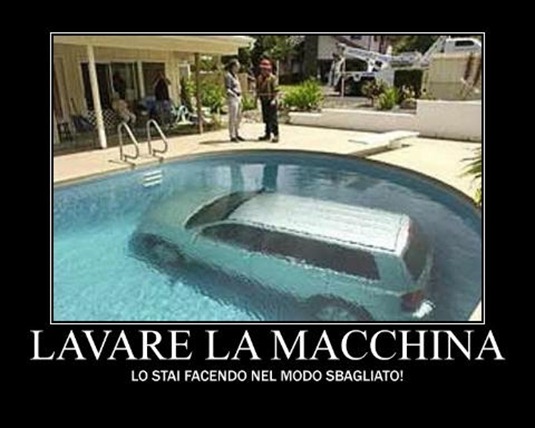Italian Transitive and Intransitive Verbs – A Practical Guide Posted by Serena on Feb 9, 2015 in Grammar
Funnily enough, a few days ago I received two different comments on a post that I wrote a long time ago on the difference between transitive and intransitive verbs. I went back and had a look at the article and decided that it’s definitely time to revise this topic. The original article is worth checking out as it gives an in-depth technical explanation of the difference between transitive and intransitive verbs, how to recognize them, and the impact this has on the construction of the past tense, so I would suggest that you might want to revise it first: Verbi Transitivi e Intransitivi
Today we’re going to look at some practical examples of these two types of verb, and their construction in the past tense.
Verbi Transitivi
N.B. in the past tense all transitive verbs are built with the auxiliary verb avere (to have):
comprare = to buy: di solito compro il pane senza sale = I usually buy unsalted bread. Past: ieri ho comprato il pane senza sale = yesterday I bought unsalted bread
incontrare = to meet: ogni sabato incontro Luisa al mercato = every Saturday I meet Luisa at the market. Past: sabato scorso ho incontrato Luisa al mercato = last Saturday I met Luisa at the market
aspettare = to wait: Maria sta aspettando l’autobus = Maria is waiting for the bus. Past: Maria ha aspettato l’autobus per 40 minuti = Maria waited 40 minutes for the bus
lavare = to wash: oggi laviamo la macchina! = today we are going to wash the car! Past: stamattina abbiamo lavato la macchina = this morning we washed the car
mettere = to put: metti il vaso sul davanzale = put the vase on the windowsill. Past: hai messo il vaso sul davanzale? = did you put the vase on the windowsill?
Verbi Intransitivi
In the past tense, some intransitive verbs use the auxiliary verb essere (to be), some use avere (to have), and some can use either. There isn’t a fixed rule, so you’ll need to learn them or to consult your dictionary.
rimanere = to stay/remain: Maria rimane a casa a studiare = Maria is staying home to study. Past: Maria è rimasta a casa a studiare = Maria stayed home studying
andare = to go: vado a Pisa in treno = I go to Pisa by train. Past: Sono andata/o a Pisa in treno = I went to Pisa by train
viaggiare = to travel: viaggiamo spesso in treno = we often travel by train. Past: abbiamo viaggiato in treno molte volte = we’ve travelled by train many times
vivere = to live: Beppe e Laura vivono a Milano = Beppe and Laura live in Milan. Past: Beppe e Laura hanno vissuto a Milano or Beppe e Laura sono vissuti a Milano = Beppe and Laura lived in Milan
 |
| Piove. Photo (CC) by Julio César Mesa |
piovere = to rain: piove = it’s raining. Past: ieri ha piovuto or ieri è piovuto = yesterday it rained
Verbi Riflessivi
N.B. in the past tense all reflexive verbs are built with the auxiliary verb essere (to be):
lavarsi = to wash oneself: ci laviamo le mani prima di mangiare = we wash our hands before eating. Past: ci siamo lavate/i le mani prima di mangiare = we washed our hands before eating
mettersi = to put on/wear: perché non ti metti quella camicia che ti sta tanto bene? = why don’t you wear that blouse that really suits you? Past: perché non ti sei messa quella camicia che ti sta tanto bene? = why didn’t you wear that blouse that really suits you?
incontrarsi = to meet up with: ogni sabato mi incontro con Luisa al mercato = every Saturday I meet up with Luisa at the market. Past: sabato scorso mi sono incontrata/o con Luisa al mercato = last Saturday I met up with Luisa at the market
svegliarsi = to wake up: Lucia si sveglia tutte le mattine alle sei = every morning Lucia wakes up at six o’clock. Past: stamattina Lucia si è svegliata alle sei = this morning Lucia woke up at six o’clock

Build vocabulary, practice pronunciation, and more with Transparent Language Online. Available anytime, anywhere, on any device.





Comments:
Kate:
Very helpful, thank you. Is the topic of transitive vs. intransitive verbs relevant to my struggle with the type of pronoun to use in sentences such as:
Marco fa cucinare i fagioli a Paola.
Marco le fa cucinare i fagioli.
Marco li fa cucinare a Paola.
Marco faglieli cucinare.
Are these correct? In general, the use of fare + l’infinito (and even worse, farsi fare o farsi + l’infinito) gives me fits. I’m wondering if a better command of the verb type, tr. or intr. would help. Thanks much.
Serena:
@Kate Salve Kate, I’m not sure about your question.
Sentences 1-3 are grammatically correct, but they are statements, not orders or commands:
Marco fa cucinare i fagioli a Paola = Marco lets/makes Paola cook the beans
Marco le fa cucinare i fagioli = Marco lets/make her cook the beans
Marco li fa cucinare a Paola = Marco lets/makes Paola cook them
Sentence n4 ‘Marco faglieli cucinare’ it’s an order, but should be written with a comma: ‘Marco, faglieli cucinare’ = Marco, let/make her cook them.
To turn sentences 1-3 into orders, you should say:
Marco, fa’ cucinare i fagioli a Paola = Marco, let/make Paola cook the beans
Marco, falle cucinare i fagioli
Marco, falli cucinare a Paola
Finally, if you want to turn sentence 4 into a statement, you should say:
Marco glieli fa cucinare
N.B. the personal pronouns must be attached to the imperative, but not to the normal present tense. Fa is the third person singular of the present tense, while fa’ (note the apostrophe) or fai are imperatives. Also, you need a comma after the name when you are giving orders.
Spero di essere stata chiara.
Saluti da Serena